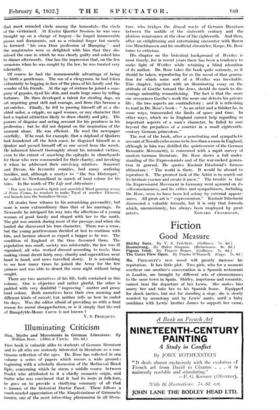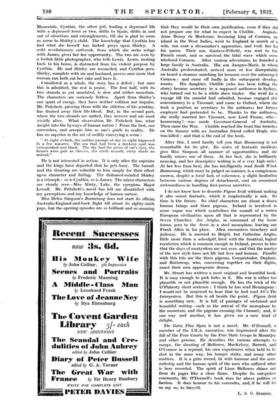Fiction
Good Measure
MR. PRITCHETT'S new novel will greatly increase his reputation. It has little plot. Two girls, who for a moment overhear one another's conversation in a Spanish restaurant in London, are brought by different sets of circumstances to the same town in Spain. Shirley, impetuous and romantic, cannot bear the departure of her Lewis. She makes him marry her and take her to his Spanish home. Equipped for shock tactics, but not for standing a siege, she is slowly worsted by monotony and by Lewis' aunts, until' a baby combines with Lewis' brother James to support her cause.
Meanwhile, Cynthia, the other girl, leading a depressed life with a depressed lover or two, drifts to Spain, drifts in and out of situations and entanglements, till she is glad to come as nurse to Shirley's child. The knowledge that Cynthia has had what she herself has lacked preys upon Shirley. A mild revolutionary outbreak, from which she seeks refuge with James, gives her her opportunity. The two are seen by a foolish little photographer, who tells Lewis. Lewis, rushing back to his home, is distracted from his violent purpose by Cynthia. He and Shirley are reconciled, and Cynthia goes. Shirley, complete with sin and husband, proves once more that woman can both eat her cake and have it.
. Considered as a whole, the story has a defect ; but once this is admitted, the rest is praise. The first half, with its two strands as yet unrelated, is slow and rather uncertain. The characters are curiously listless. Apart from Shirley's one spurt of energy, they have neither volition nor impulse. Mr. Pritchett, piercing them with the stilettos of his scrutiny, has drained away their life-blood. But, in the second part, where the two strands are united, they recover and are most :vividly alive. What observation Mr. Pritchett has, what insight into the byways of human nature ! From the first, one surrenders, and accepts him as one's guide to reality. He has no superior in the art of swiftly conveying a scene : "At eight o'clock, the sudden passagmof day to night happened in a few minutes. The sea that had been a lambent opal was extinguished and black. The sky had the green of cat's eyes, the houses were pale as cheeses, the earth smooth, every shade an animal."
He is not interested in action. It is only after the captains and the kings have departed that he gets busy. The tumult and the shouting are valuable to him simply fort their effect upon character and feeling. The dishonest-minded Shirley is a triumph : so is Cynthia, so is James. The minor characters are clearly seen—Miss Minty, Lake, the egregious Major Lernill. Mr. Pritchett's novel has left me dissatisfied with say perceptions and my knowledge of human nature.
Miss Helen Simpson's Boomerang does not start its official Australia-England-and-back flight till about its eighty-sixth page, but the opening episodes are so brilliant and so amusing
that they would be their own justification, even if they did not prepare one for what to expect in Clotilde. Auguste. Anne Boissy de Mortemar, becoming king of Corazon, an island in the West Indies, went to England in search of is wife, ran over a dressmaker's apprentice, and took her for his queen. Their son, Gustave-Felicite, was sent to the French court, and so survived the tidal wave which over- whelmed Corazon. After various adventures, he founded a large family in Australia. His son Jacques-Marie, in whom Australia predominated, arrived more or less disreputably on board a steamer searching for treasure over the submerged Corazon : and came off badly in the subsequent develop. rnents. His daughter, Clotilde (who has been telling the story) became secretary to a supposed authoress in Sydney, who turned out to be a white stave trader. She went for a voyage till the scandal had subsided, became engaged (for convenience) to a Viscount, and came to Oxford, where she took a position as secretary to the authoress her former employer had pretended to be. Thanks to the authoress, she really married her Viscount, now Lord Frome, who—. boomerang !—was made Governor-General of Australia. Then came.the War. Clotilde reached the front line trenches on the Somme with an Australian friend called Hugh, who was killed : and that is the end of the book.
' After this, I need hardly tell you that Boomerang is not remarkable for its plot. Its series of fantastic incidents give Miss Simpson all manner of opportunities, and she hardly misses one of them. At her best, she is brilliantly amusing, and her descriptive writing is of a very high order. At her less than best, she has intelligently read South Wind. Boomerang, which must be judged on manner, is a conspicuous success, despite a total lack of coherence, a slight hesitation between various degrees of detachment, and an occasional awkwardness in handling first-person narrative.
I do not know how to describe Pigeon Irish without making it also sound fantastic, which it emphatically is not. Its time is the future. Its chief characters are about a dozen human beings and three pigeons. Ireland is involved in some vague war which symbolizes the assault of a rotten European civilization upon all that is represented by the Seven Churches. Joe Arigho, in command of the home forces, goes to the front in a steel monoplane, leaving one Frank Allen in his place. Allen encounters treachery and jealousy. He is married to Brigid, but Catherine Arigho, little more than a schoolgirl, fired with the fanatical, logical mysticism which is common enough in Ireland, proves to him that the days of martyrdom are not over, and that the martyr of the new style loses not life but love and honour. Parallel with this trio are the three pigeons, Conquistador, Daphnis, and Buttercup, who, conversing together on their flights, enact their own appropriate drama.
Mr. Stuart has written a most original and beautiful book. It is easy enough to pick holes in it. His war is either too plausible or not plausible enough. He has the trick of the O'Flaherty short sentence : I think he has read Hemingway: I would not be surprised to hear that he had read AE's The Interpreters. But this is all beside the point. Pigeon Irish is something new. It is full of passages of sustained and beautiful writing—such as the arrival of the monoplane by the mountain, and the pigeons crossing the Channel; and, in one way and another, it has given me a rare kind of delight.
The Gates Flew Open is not a novel. Mr. O'Donnell, a member of the I.R.A. executive, was imprisoned after the fall of the Four Courts by the Free State troops in Mountjoy and other prisons. He describes the various attempts to escape, the shooting of Mellowes, MacKelvey, Barrett, and O'Connor as a reprisal, his own experiences when held to to shot in the same way, his hunger strike, and many other matters. It is a grim record, lit with humour and the com- radeship and the human spirit of the men who suffered what is here recorded. The spirit of Liam Mellowes shines out from its pages like a clear flame. Despite its outspoken comments, Mr. O'Donnell's book rises far above politics or faction. It does honour to his comrades, and, if he will let us say so, to himself.
L. A. G. STRONG.









































 Previous page
Previous page